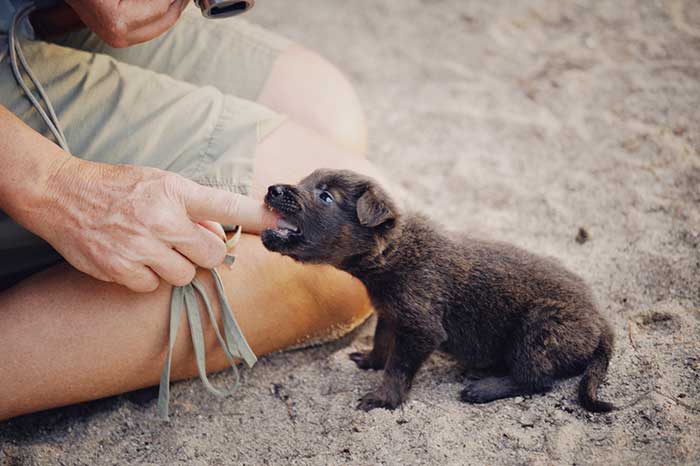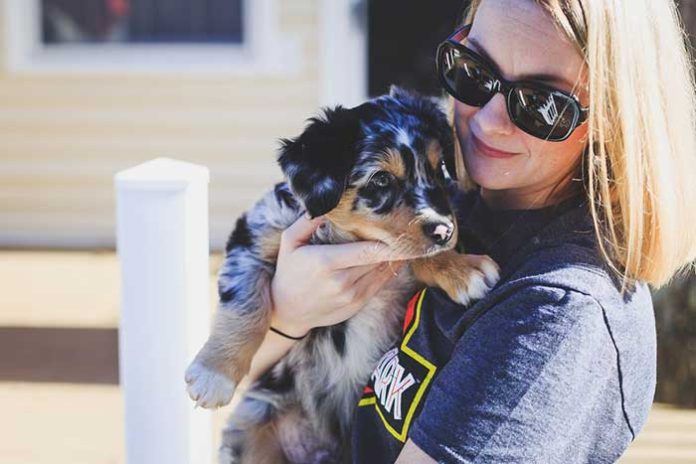Getting a puppy is always an exciting and happy time – or at least that’s what we’re led to believe. However, it doesn’t happen right away. A full grown cavapoo might be adorable and well-behaved but not as a puppy. Most puppy owners have to go through a period of extreme stress, depression and even anger after bringing home their new furry friend – a state known as “Puppy Blues.” If you’re a new dog owner and are also suffering from negative emotions instead of being happy and joyful, then the following information will be extremely helpful to you.
What are Puppy Blues?

Puppy Blues, also sometimes called Post-Puppy Depression is a state where new pet owners suffer depressive and negative emotions such as anger, remorse, bitterness, stress, sadness etc. They might spend hours crying each day and feel overwhelmed because of their new puppy. It is also accompanied by feelings of helplessness over the situation. Puppy blues are very common in people so there’s no need to feel guilt over this. In fact, it resembles Post-Partum Depression in its symptoms. Even happy dog owners feel these emotions initially.
Common Symptoms Associated with Post-Puppy Depression

Here are the most common symptoms one might feel if they’re suffering from Post-Puppy Depression. Check off the list to see how severe your case is:
- Sadness and feeling down
- Anger and resentment towards the puppy
- Crying frequently
- Feeling overwhelmed
- Exhaustion and Fatigue
- A state of helplessness
- Regret over adopting the puppy
- Feeling remorse and guilt
- Wanting to escape and run away
- In extreme cases, it can even trigger suicidal thoughts
Suggested: Online Therapy
5 Reasons why you’re feeling the Puppy Blues

It is not unreasonable to feel negative emotions after getting a puppy. Undoubtedly, there are many reasons why new pet owners feel this way. Animals are different from human beings and have many strange behaviors such as zoomies, howling, etc. that we do not understand, leading to confusion and stress. That’s why understanding the reason behind your depression is the first step to resolving this issue.
1. The Constant Puppy Noises
For the first 3 weeks, Puppies are calm creatures who sleep for the majority of the time. However, after that comes a phase where they are extremely playful and learning to be a dog. They are super experimental and interactive. In other words, they constantly bark, yelp, cry and whine. They are uninhibited and express their emotions loudly. These constant noises can become too much for new pet owners. It can disturb their sleep cycle and make them restless.
2. Biting and Destructive Chewing
As said earlier, puppies are very experimental at the age when they get adopted. Usually, it is healthy to put puppies up for adoption after 8 weeks. This developmental phase of Puppies is significant because they get to socialize with their littermates. This teaches them how to control their jaw pressure and not to bite others excessively. However, puppies who don’t go through this experience bite and chew everything they can find. Moreover, teething is also a lead reason behind their constant biting and chewing. Unfortunately, they can bite their owners and other people around them very painfully as well. Not to mention, they can destroy clothes, rugs, toys, curtains, etc. Leading to great distress and frustration for new pet owners.
3. Responsibility of Taking Care of the New Dog
People who already have some pet or had one during childhood are much more capable of adjusting to a new puppy. But, for people who have never owned a pet, this is most challenging. A puppy requires a lot of care. From toilet training to food to going on walks, it is a lot of work. Some might even say, it’s the same amount of work as taking care of a newborn baby. Inexperienced pet owners can feel overwhelmed at the notion of having another living being depend on them completely. They can feel exhausted by new responsibilities and the amount of work involved.
4. Changed Lifestyle might get Overwhelming
Undoubtedly, a pet owner’s lifestyle is completely different from a non-pet owner’s. Usually, people have to change their lifestyle to suit the needs of their new puppy. This sudden and almost overnight change can also be the cause behind your puppy blues. You can feel overwhelmed and struggle to make changes. Your sleep schedule might also suffer, leading to irritableness and tiredness.
5. Unmet or False Expectations of life with your Puppy
One of the biggest causes of puppy depression is unmet expectations. Before getting the puppy, you might have seen other happy dog owners who get unlimited snuggles with their fur babies. You might have also thought that it’s easy to train a dog and make them behave well. However, things are never that simple. You can never get the full picture unless you experience it first-hand. The reason you feel sad and disappointed is that your reality is quite different from what was promised – that of a rosy happy life with a well-behaved puppy. No doubt, the benefits of adopting a pet are numerous, but so are the challenges, which are rarely talked about.
How Long does Puppy Blues Last?
This depressive state can last from anywhere between a few weeks to a few months. Usually, it is the worst in an initial couple of weeks after getting the puppy. Gradually, people get used to the change and take measures to make the puppy behave well and get accommodated in its new home. This greatly improves and even eliminates negative emotions. It is important to not give in to despair and rise up to the challenge!
Best Ways to Cope with Puppy Blues and other Negative Feelings after Getting a Puppy

The reason why Puppy Blues is not often talked about is that people forget about this extremely stressful period after their puppy is trained and well-adjusted to the home. Plus, the euphoria and cuddles that come after it. Of course, it can seem like a never-ending nightmare when you’re going through it. But fret not, there are ways to cope with Post-Puppy Depression.
Also Read: Coping Skills for Kids
Taking a Break Helps Puppy Blues
Firstly, if you’re feeling overwhelmed and exhausted, you need to take a break. Get your spouse or partner to help take care of the puppy. Or call in a dog sitter. Go somewhere else for a day and get a good sleep. Being away from the constant noise and sleeping restfully will put you in a better frame of mind. Once you’re well rested, you might feel that the problem is not that bad. Keep in mind, that it is important to recharge before tackling a challenge. Treating yourself to a peaceful day out and maybe even your favorite food will surely diminish the negative feelings.
Consult a Dog Trainer
Raising a dog is very difficult. Even more so for first-time pet owners. You need all the help you can get. That’s why consulting a credible dog trainer or your vet can be extremely helpful. All puppy owners go through what you’re going through. Therefore, experts will definitely have a solution to all the problems you’re facing right now. Most importantly, keep in mind that animals communicate with us through their actions. So, instead of getting frustrated and angry at the puppy for doing something undesirable, try to understand why it is doing so.
Manage Space – assign specific space to your puppy
Having a puppy roam freely about the house is the recipe for disaster. They will pee anywhere on the floor and chew everything in sight and basically destroy your house. This is another leading cause of puppy blues. In order to resolve this situation, you need to manage space. Assign a specific area to your new puppy. It could be a room or just a playpen outside their crate. Furthermore, keeping them on a leash even inside the house can help control them and minimize damage.
Pro Tip: In order to get them accustomed to their space, use positive reinforcement to train puppies. Give them treats for staying in their crate or their space. That way, they will associate the space with treats and happy emotions.
Teach Bite Inhibition

To stop puppies from biting you and potentially hurting you dangerously, teach them bite inhibition. Puppies learn this by staying among their littermates and biting them playfully. They keep biting forcefully until the other puppies let out a yelp. This teaches them that it is not okay to bite that hard. You can easily do this with your puppy as well. The easiest way to teach them bite inhibition is to also let out a loud cry or an “ouch” whenever the puppy bites too hard. Then, simply walk away calmly from them. This will tell them that they’ve hurt you by biting hard which stopped playtime. Puppies are extremely intelligent and learn very quickly. A couple of repetitions of this drill should take care of their biting problem.
Remove Expensive and Valuable items from your House to Minimize Damage
It is better to be safe than sorry. You can not count on your puppy immediately become a well-behaved dog. Therefore, it is good to remove all the valuable items from your house. It is better to do it before the puppy arrives in his new home. It will take him or her time to learn house rules so they might pee on an expensive white rug or break a valuable vase etc. You can avoid yourself much distress and overwork by removing such precious items.
Connect with other Dog Owners and Pet Support Groups
Talking to friends, especially pet owners, can be greatly useful as well. They can provide you with emotional support, helpful tips for raising your new pup and even the best gifts to get for your new fur baby. A dog trainer can help you figure out your puppy’s behaviors and how to train them. But friends and pet groups are better for emotional strength and support. If you have no one like that near you, then you can get help from online support groups. There are plenty on Facebook. Plus, there’s an entire subreddit dedicated to puppy blues where people share their personal struggles with their new puppy and not being a good pet parent.
Last Resort: Re-home the Puppy
Rehoming or returning the puppy should be your last resort. Do not forget that at the end of all this challenge lies a lifelong companion who will love you unconditionally. It is worth it to make the effort for our furry friends. However, if you absolutely cannot adjust to life with your new pup or have failed to train him despite trying, then it is better to let them go. Puppy blues should go away in a few weeks but if it’s taking a huge toll on your mental health, then do not hesitate. Your mental health and wellbeing comes first. Nothing good will come out of suffering yourself and making the puppy suffer as well. They might live a better life in a new home.
Conclusion:
It is very challenging to take care of a puppy but not impossible. Most importantly, you are not alone. Every pet owner struggles through something similar. However, even if you’re familiar with the potential problems, your struggle might be unique to you because every dog is unique. The key here is to not give up and receive support for the sake of a truly blissful lifetime companion and unlimited snuggles and love!
Read Also: What Are The Most Luxurious And Exotic Cat Breeds In The World





